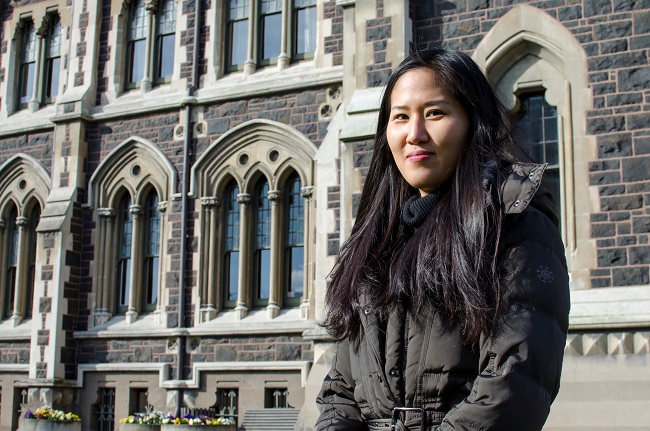 Saemyi Chung, PhD candidate
Saemyi Chung, PhD candidate
What will you look like in 30 years time? Saemyi Chung says this interesting but seldom-asked question provided a good starting point for research into the complexities of how Korean immigrant women in New Zealand experience, and manage, ageing.
Saemyi says the question has taken her PhD in the Department of Sociology, Gender and Social Work in many rewarding directions, but also draws on personal experiences of being a Korean woman living in North America and New Zealand.
“In South Korean society the pressure to maintain beauty and youth is higher than in New Zealand. That pressure comes from the social norms or stereotypes of gender, ageing and beauty. I want to know more about how and why these factors vary in different societies. Studying how Korean women living in New Zealand feel about ageing, how they manage their bodies, and use anti-ageing products or practices is a very good starting point.”
Since beginning her project in 2013, Saemyi has interviewed 31 women aged between 50 and 84 who live in Auckland, Christchurch, Dunedin, Hamilton and Queenstown.
Comparing cultural beauty practices
Her respondents reported that there is “less of an obsession in New Zealand's culture” with beauty and beauty practices, compared with Korean society.
However, she notes that certain internal and external pressures within the Korean expatriate community meant the women surveyed felt pressure to “navigate a diverse range of positions.”
While participants perceived New Zealand as a place where there is less pressure to adhere to various beauty practices, they still felt pressure because of “social expectations and to make a positive impression with Kiwis and other ethnic groups.”
Also, involvement in the smaller Korean immigrant community meant respondents were conscious of links between social standing, reputation and appearance.
Invaluable input
Saemyi says studying in the Department has been extremely beneficial, and she describes supervisory input from Professor Amanda Barusch and from Sociology Senior Lecturer Melanie Beres as “invaluable.”
Many of the issues she explores have broader implications for members of all cultural groups.
“Aside from helping understand the concerns and issues of minority ethnic older women as they try to find acceptance for their ageing bodies while maintaining their unique identity, my research is also about exploring the basic human desire for beauty and how, with age, it becomes harder to conform to dominant ideas of beauty.
“We should all reflect on how we affect, and are affected by, the social norms and stereotypes of gender, ageing and beauty – one day, when we are old, we will be subject to those norms and stereotypes.”
